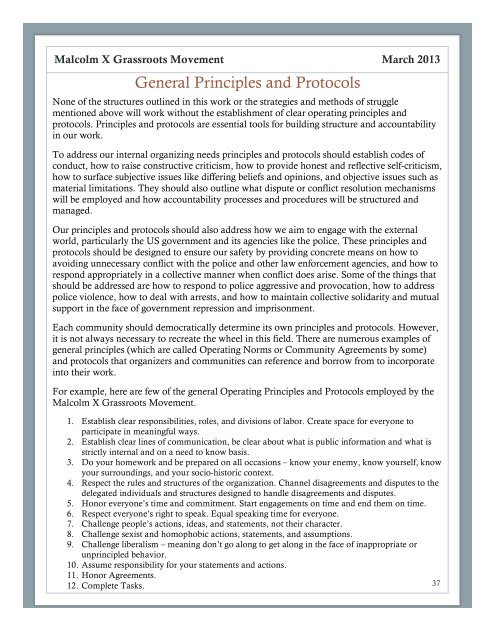MXGM Self-Defence Manual
MXGM Self-Defence Manual
MXGM Self-Defence Manual
Create successful ePaper yourself
Turn your PDF publications into a flip-book with our unique Google optimized e-Paper software.
;<br />
Malcolm X Grassroots Movement March 2013<br />
General Principles and Protocols<br />
None of the structures outlined in this work or the strategies and methods of struggle<br />
mentioned above will work without the establishment of clear operating principles and<br />
protocols. Principles and protocols are essential tools for building structure and accountability<br />
in our work.<br />
To address our internal organizing needs principles and protocols should establish codes of<br />
conduct, how to raise constructive criticism, how to provide honest and reflective self-criticism,<br />
how to surface subjective issues like differing beliefs and opinions, and objective issues such as<br />
material limitations. They should also outline what dispute or conflict resolution mechanisms<br />
will be employed and how accountability processes and procedures will be structured and<br />
managed.<br />
Our principles and protocols should also address how we aim to engage with the external<br />
world, particularly the US government and its agencies like the police. These principles and<br />
protocols should be designed to ensure our safety by providing concrete means on how to<br />
avoiding unnecessary conflict with the police and other law enforcement agencies, and how to<br />
respond appropriately in a collective manner when conflict does arise. Some of the things that<br />
should be addressed are how to respond to police aggressive and provocation, how to address<br />
police violence, how to deal with arrests, and how to maintain collective solidarity and mutual<br />
support in the face of government repression and imprisonment.<br />
Each community should democratically determine its own principles and protocols. However,<br />
it is not always necessary to recreate the wheel in this field. There are numerous examples of<br />
general principles (which are called Operating Norms or Community Agreements by some)<br />
and protocols that organizers and communities can reference and borrow from to incorporate<br />
into their work.<br />
For example, here are few of the general Operating Principles and Protocols employed by the<br />
Malcolm X Grassroots Movement.<br />
1. Establish clear responsibilities, roles, and divisions of labor. Create space for everyone to<br />
participate in meaningful ways.<br />
2. Establish clear lines of communication, be clear about what is public information and what is<br />
strictly internal and on a need to know basis.<br />
3. Do your homework and be prepared on all occasions – know your enemy, know yourself, know<br />
your surroundings, and your socio-historic context.<br />
4. Respect the rules and structures of the organization. Channel disagreements and disputes to the<br />
delegated individuals and structures designed to handle disagreements and disputes.<br />
5. Honor everyone’s time and commitment. Start engagements on time and end them on time.<br />
6. Respect everyone’s right to speak. Equal speaking time for everyone.<br />
7. Challenge people’s actions, ideas, and statements, not their character.<br />
8. Challenge sexist and homophobic actions, statements, and assumptions.<br />
9. Challenge liberalism – meaning don’t go along to get along in the face of inappropriate or<br />
unprincipled behavior.<br />
10. Assume responsibility for your statements and actions.<br />
11. Honor Agreements.<br />
12. Complete Tasks.<br />
37


